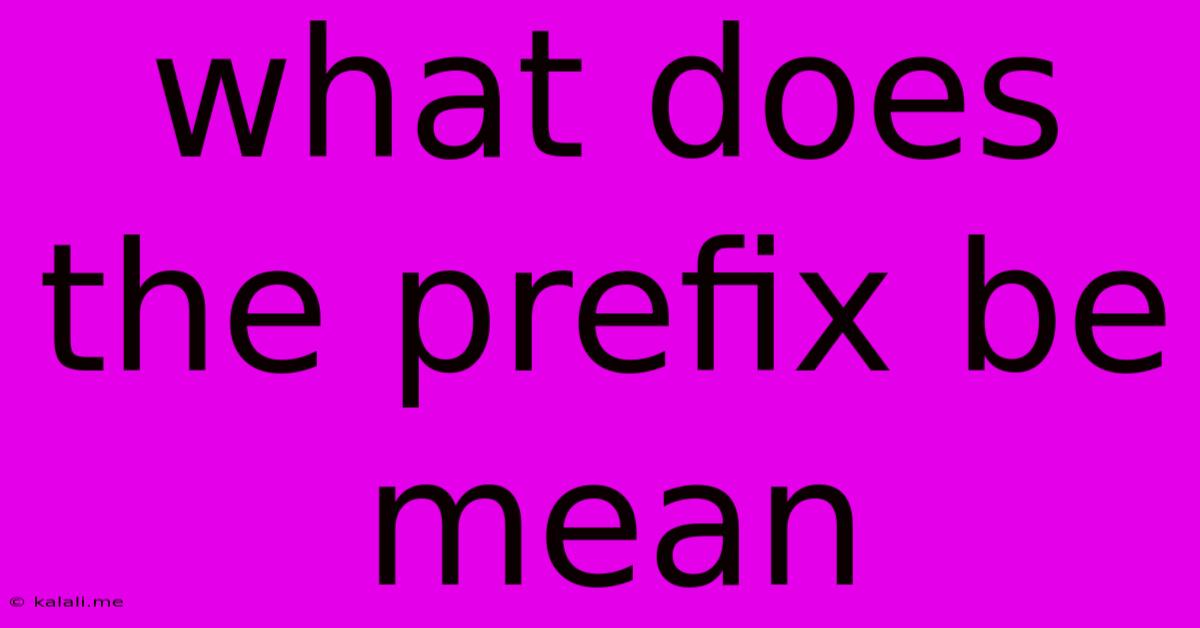What Does The Prefix Be Mean
Kalali
May 31, 2025 · 2 min read

Table of Contents
What Does the Prefix "Be-" Mean? A Deep Dive into its Nuances and Usage
The prefix "be-" can be tricky. Unlike some prefixes with a clear-cut single meaning, "be-" possesses a fascinating fluidity, its precise function often dependent on context. This article will explore the various meanings and applications of "be-" in English, clarifying its usage and highlighting its subtle variations. Understanding this prefix will significantly enhance your vocabulary and comprehension of the English language.
The Core Meaning: To Make or Cause to Be
At its heart, "be-" often signifies the act of making something or causing something to become. This core meaning manifests in various ways:
- Adding a state or condition: Consider words like "befriend" (to make someone a friend) or "befog" (to make something foggy). The prefix indicates a change in state, bringing about a new condition.
- Intensifying or emphasizing: Words like "besmirch" (to greatly soil one's reputation) or "belittle" (to make someone seem small or unimportant) illustrate how "be-" can intensify the action of the root word.
- Surrounding or enveloping: Think of "besiege" (to surround with armed forces) or "bedeck" (to decorate or adorn). Here, "be-" suggests an encompassing action.
Variations and Subtleties
The meaning of "be-" is not always straightforward and can shift subtly based on the root word it's attached to. Let's explore some examples:
- Be- as an intensifier, not a causative: In words like "beseech" (to implore earnestly) or "belabor" (to explain something excessively), the prefix doesn't necessarily cause something to happen but rather emphasizes the action.
- Be- indicating a deprivation: Words like "bereave" (to deprive someone of something valuable) showcase another facet, where "be-" implies a taking away or loss.
- Regional and archaic uses: The prefix "be-" has a rich history, and some uses are more common in certain dialects or are considered archaic. Examples may include words that are less frequently used in modern English.
Distinguishing "Be-" from Other Prefixes
It's important to differentiate "be-" from other prefixes that might share some semantic overlap:
- "En-": While both "be-" and "en-" can suggest surrounding or enclosing, "en-" often focuses more on the process of enclosing or embedding something within. Compare "encircle" to "besiege."
- "Fore-": This prefix clearly indicates something happening before an event, in contrast to "be-"'s more nuanced meanings.
Mastering the Prefix "Be-"
To fully grasp the meaning of the prefix "be-", consider the context of each word. Paying close attention to the root word and the overall sentence structure is key to correctly interpreting its function. Building your vocabulary by encountering numerous words with the "be-" prefix will further enhance your understanding of its subtle yet powerful influence on the English language. Through continued practice and exposure, you'll master the nuances of this versatile prefix and significantly improve your understanding and use of the English language. Remember, context is king when deciphering the subtle meanings inherent within the prefix “be-.”
Latest Posts
Latest Posts
-
What Is A Medium In Waves
Jun 02, 2025
-
Microscope How Much Magnification Do I Need For Various Things
Jun 02, 2025
-
Do She Hulk Have The Unlimited Strength As The Hulk
Jun 02, 2025
-
How To Weigh Something Without A Scale
Jun 02, 2025
-
How To Keep Washer Lines From Freezing
Jun 02, 2025
Related Post
Thank you for visiting our website which covers about What Does The Prefix Be Mean . We hope the information provided has been useful to you. Feel free to contact us if you have any questions or need further assistance. See you next time and don't miss to bookmark.